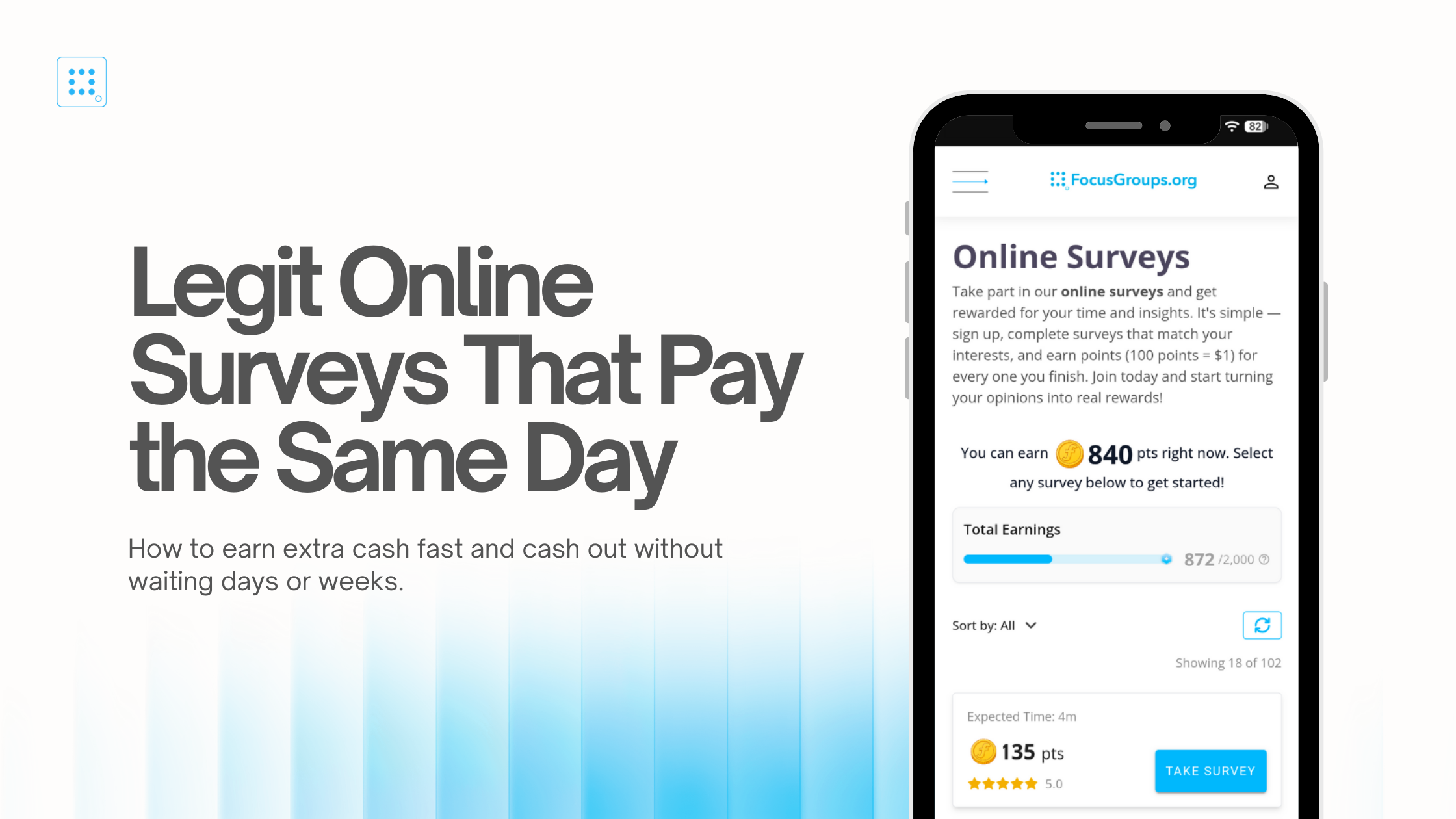Focus Groups vs. Surveys: The Pros and Cons You Need to Know
Ever done a focus group or taken a survey? They're useful in different ways. We'll break down how focus groups and surveys work, so you can decide which is a better fit based on what you enjoy and how you like to share your opinions.

Have you ever participated in a focus group or taken an online survey? Both are common methods that market researchers use to gain insights from everyday people like you. But do you know the key differences between these two techniques?
Understanding those distinctions can help you decide which opportunity better matches your personality, abilities, and preferences when it comes time to share your perspectives.
This post will share the pros and cons of focus groups versus surveys. Let’s dive in!
A Quick Refresher: Focus Groups and Surveys
First, let’s make sure we’re all on the same page about what focus groups and surveys actually are.
What Are Focus Groups?
Focus groups bring together a small group of 6-12 participants in person, by phone, or online. A moderator leads an open discussion, guiding participants to share opinions, experiences, and attitudes about a product, concept, advertisement, or service.
Sessions often last 1-2 hours. Companies use focus group insights when developing new offerings or improving existing ones.

What Are Surveys?
Surveys ask a series of questions designed to gain quantifiable data from a large sample of respondents. Questions seek objective facts, opinions, beliefs, and behaviors from individuals.
Surveys are self-administered online, by phone, mail, or in person. They tend to be shorter in length than focus groups. Researchers use survey data to identify patterns and form conclusions.
Now that we’re on the same page about the basics let’s look at how these two methodologies differ.

Key Differences Between Focus Groups and Surveys
While focus groups and surveys both provide valuable consumer insights, they have distinct differences when it comes to techniques and applications.
Participant Recruiting and Sampling
Focus groups require very specific participant recruitment based on carefully screened criteria to get a diverse mix of perspectives within a small group.
Surveys use broad distribution methods to obtain large, randomized samples representative of the target population. Less screening is involved.
Questioning Approach
Focus groups use open-ended questions and natural conversation between participants. The moderator guides rather than directs the discussion flow.
Surveys use structured, closed-ended questions with definitive response options. All participants receive the identical questions in the same order.

Data Collection
Focus groups gather qualitative, descriptive data based on nuanced personal opinions and experiences revealed through open discussion.
Surveys collect quantitative data like checkboxes and rating scales that can be statistically analyzed to identify trends. Written responses are limited.
Session Length
Focus groups typically last 1-2 hours to allow robust conversation centered around 3-5 key topics.
Surveys take 5-15 minutes to quickly capture responses across a wider breadth of questions on a broader topic.

Location and Environment
In-person focus groups are often held in comfortable, conversational spaces with refreshments provided to create an engaging atmosphere.
Surveys are entirely self-administered remotely by individuals in their own environment. No facilitation or interaction is involved.
Sample Size
Focus groups engage a small sample size of 6-12 people. This allows for in-depth insights from each participant.
Surveys collect data from hundreds or thousands of respondents to draw conclusions about the larger population. Individual data is less detailed.
Data Analysis
Focus group data requires qualitative analysis by coders to identify key themes, patterns, and quotable insights.
Survey data undergoes quantitative analysis to surface statistically significant trends like cross-tabbed percentages, correlations, etc.

Payment for Focus Groups vs. Surveys
One key difference to consider is how you are compensated for your participation.
Focus groups provide significantly higher financial incentives than surveys, typically $75-$150 or more for 1-2 hours. Food, gift cards, or free product samples are often provided as well.
Online surveys offer minimal compensation in the $1-$5 range for 5-15 minutes of your time. Occasional sweepstakes entries may be offered instead of direct payment.
This makes sense, given the greater time commitment and discussion involvement for focus groups. The pay reflects your higher value contribution.
If direct compensation is a priority, focus groups are certainly more lucrative. But surveys enable earning a smaller amount more frequently in bite-sized increments.
When Are Focus Groups or Surveys Better Suited?
Now, the big question: Should you participate in focus groups or surveys? The best method for you depends on your preferences and abilities.
Consider Focus Groups If You
- Enjoy open-ended discussion and sharing opinions conversationally
- Can commit 1-2 hours consistently for in-person or remote sessions
- Prefer higher compensation for your time and insights
- Want to contribute to product development with qualitative feedback

Consider Surveys If You
- Prefer quick, simple sharing of opinions through closed-ended questions
- Have limited time - you can complete surveys in 5-15 minute increments
- Don't mind lower compensation but want frequent opportunities
- Like contributing quantitative data to broader research goals
Focus groups and surveys each have their unique advantages. Evaluating your preferences and abilities can help determine which method suits you best.

Tips to Maximize Your Experience
Here are a few closing tips to make the most of focus groups and surveys based on their different approaches.
- Focus Groups - Prepare open-ended anecdotes and speaking points to contribute. Actively listen and build on what others share.
- Surveys - Read questions carefully and answer thoughtfully. Don't rush or skim. Check at the end for completeness.
- Either Method - Be honest, attentive, and respectful. Follow all instructions from the moderator or survey provider.

An occasional change of pace is great, too – try both focus groups and surveys for a well-rounded experience!
Want to Get Started? Join Our Community!
We hope this comparison helps you better understand focus groups vs surveys so you can decide which opportunity is right for you.
Ready to dive in and start earning? We match real people just like you with paid opportunities based on your interests and demographics. Sign up here to get started with sharing and earning today. We can't wait to hear from you!





